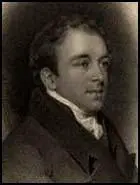Henry Grey Bennet

Henry Grey Bennet, the second of three sons and fourth of eight children of Charles Bennet, fourth earl of Tankerville (1743–1822), was born on 2nd December 1777. He was educated at Eton College and after leaving in 1792 he served five years in the 1st Foot Guards.
Bennet studied at Peterhouse in 1799 before entering Lincoln's Inn. He was called to the bar in 1803, and afterwards practised on the western circuit. His friend, Thomas Creevey, described him as the "most amiable, occasionally most boring, but at all times most upright and honourable".
In 1806 Bennet was elected as MP for Shrewsbury. Bennet's support of Catholic Emancipation resulted in defeat in 1807. However, he regained his seat in 1811. Bennet was one of the most progressive MPs in the House of Commons and usually associated with other radicals such as Charles Fox, Samuel Whitbread, Henry Brougham, Thomas Creevey and Samuel Romilly. The author of The Making of the English Working Class (1963), Edward Thompson, has argued: "While the democratic persuasions of most of the group were largely speculative, individual members - Sir Samuel Romilly, Samuel Whitbread, H. G. Bennet - stood up again and again in the House to defend political liberties or social rights."
Bennet supported parliamentary reform and this brought him into conflict with Robert Stewart, Viscount Castlereagh, leader of the house, with the home secretary Henry Addington, first Viscount Sidmouth. According to his biographer, Roland Thorne: "His quest for... a reformed parliament meant frequent tirades against army estimates, civil list extravagance, and taxes. He assailed other reactionary regimes sanctified by Napoleon's final defeat, before which he toured the continent. He condemned post-war curtailment of civil liberties, and support for parliamentary reform involved him in metropolitan politics."
Slavery in the United States (£1.29)
On 15th May 1816 Bennet married Gertrude Frances, the daughter of Lord William Russell, the Whig MP for Tavistock. They had one son and three daughters. He was devastated by death of his son and one of his daughters.
Bennet joined forces with Samuel Romilly in an effort to reform criminal law. He successfully piloted the abolition of gaol fees and overthrew statutory rewards for informers on felony in 1818. He also campaigned against flogging, capital punishment, and argued for better treatment for political prisoners and lunatics.
John Wade, the author of The Extraordinary Black Book: An Exposition of Abuses in Church and State, Courts of Law, Representation, Municipal and Corporate Bodies, commented: "Always at his post. Supports Mr Hume nobly. Tells the Collective Wisdom home truths. Calls for useful papers and documents. Shames the rogues... Great… as the labours of Mr Hume have been, it may be doubted whether all his exertions can be put in competition with the single act of Mr Bennet in obtaining an accurate return of the salaries, offices and emoluments of the honourable Members."
Bennet's public reputation was ruined by the claim that he had importuned a young male servant at Spa in August 1825. Although he was not charged he resigned his parliamentary seat and went to live in a villa near Lake Como.
Henry Grey Bennet died in Lombardy on 29th May 1836.
Primary Sources
(1) Edward Thompson, The Making of the English Working Class (1963)
In 1797, as Pitt's repression settled upon the country, Grey and Fox moved for a last time a motion in the House for household suffrage. Thereafter, Fox and his patrician rump of Whig "commonwealthsmen" seceded from the House, in protest against the suspension of Habeas Corpus and in opposition to the war. They retired to their country mansions, their amusements and their scholarship, their discussions at Holland House and Brooks' Club. Wealthy and influential, they could not be altogether excluded from political life, since they were secure in the possession of rotten boroughs which their own principles denounced. After 1800 they drifted back and resumed their seats in the House. While the democratic persuasions of most of the group were largely speculative, individual members - Sir Samuel Romilly, Samuel Whitbread, H. G. Bennet - stood up again and again in the House to defend political liberties or social rights.

